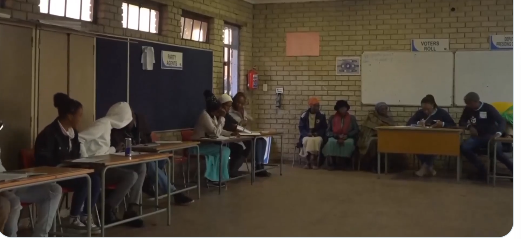Millions of South Africans are currently casting their votes in a general election that is anticipated to be the most significant since the end of apartheid. This election could see the African National Congress (ANC) potentially lose its majority for the first time since Nelson Mandela led the party to victory in 1994. Despite challenges in polling accuracy, it is widely agreed among analysts that the ANC is facing its most formidable competition to date, amid widespread dissatisfaction with the country’s trajectory.
"Biggest Election Since Mandela In '94" – South Africa Goes To The Polls In Make-Or-Break Moment
Voting began Wednesday as the African National Congress party (ANC) reportedly fighting for survival as almost half the 62mn population are living in poverty.
The most advanced… pic.twitter.com/rN87BYtFmt
— RT_India (@RT_India_news) May 29, 2024
President Cyril Ramaphosa, who is also the leader of the ANC, emphasized the importance of this election, describing it as a crucial decision point for the nation’s future. During a rally in Soweto, Ramaphosa framed the election as a choice between progressing with the ANC towards a brighter future or regressing to a bleak past. He expressed strong confidence that the South African public would renew their trust in the ANC to continue leading the country forward.
South Africa is grappling with severe issues including being the most unequal country in the world, a staggering unemployment rate, pervasive corruption, sluggish economic growth, frequent power outages, and escalating violent crime. These problems disproportionately affect the Black majority, who suffer from high rates of unemployment and poverty, a legacy of inadequate public education systems, while the White minority generally enjoys better employment and higher wages.
The ANC is projected to lose majority for first time since 1994.@YousraElbagir speaks to the voters heading to the polls in South Africa.
'We are hoping this will bring a more a balanced share of power' one voter says. https://t.co/T88Y7VNkRy
📺 Sky 501 and YouTube pic.twitter.com/bsVK22s7LY
— Sky News (@SkyNews) May 29, 2024
On election day, voters in Johannesburg were eager to voice their desire for change. From early morning, people like Sydney Radebe, a 66-year-old actor and filmmaker, expressed frustration over the lack of ownership and economic freedom despite the country’s wealth. Many first-time voters, including 20-year-old Newton Ugboh, also showed up early, driven by a desire for change and a better handling of the issues plaguing young South Africans, such as the severe joblessness.
Roselyne Tswakae, a healthcare worker, voiced her concerns about the dim prospects for the youth, pointing to the broken promises regarding the value of education, which has left many graduates unemployed and turning to substance abuse. Similarly, David Ngobeni, a 31-year-old land surveyor, and Ncumisa Xabanisa, a 40-year-old mother of two, highlighted the pervasive unemployment and economic stagnation that have disillusioned many voters.
#ICYMI, the 5/28 update with @sumitranydoo, ahead of #Elections2024 in #SouthAfrica
Given a headline unemployment rate at 32.9%, the worst power crisis in decades & an economy caught in a sub 2% growth trap – will voters punish the #ANC at the polls? pic.twitter.com/movIiQRkqF
— Ramah Nyang (@Ramah_Nyang) May 29, 2024
The election features a broad array of parties, with 52 on the national ballot. This includes new entries like the uMkhonto weSizwe Party, founded by former President Jacob Zuma. Despite legal challenges and Zuma’s own legal troubles, his party remains a contender in the election. The lead-up to the election saw intense campaigning, with parties like the Democratic Alliance forming coalitions and promising to end the long-standing ANC majority, which they criticize for perpetuating mismanagement and corruption.
This seventh general election since the cessation of white minority rule marks a pivotal moment with a record 27.79 million registered voters. Early reports from the Independent Electoral Commission noted enthusiastic voter turnout, with significant numbers casting their ballots early in the day. Despite some logistical issues at polling stations, the electoral process was reported to be progressing well, underscoring the high stakes and the electorate’s eagerness to influence the direction of their nation.
Major Points
- South Africa is holding a crucial general election, potentially ending the ANC’s majority since 1994.
- President Cyril Ramaphosa emphasizes the election’s importance, framing it as a choice for the nation’s future direction.
- Key issues include extreme inequality, high unemployment, rampant corruption, and poor public services, disproportionately affecting the Black majority.
- Voters express a strong desire for change, citing economic and employment challenges.
- The election sees high voter turnout and features 52 parties, highlighting widespread public engagement and the possibility of a shift in political power.
Fallon Jacobson – Reprinted with permission of Whatfinger News



